I originally posted here:
http://bench-racing.blogspot.com/2011/04/richard-petty-museum-visit-trophies.html
Cleveland, Ohio is supposedly where the phrase "rock and roll" was joined. As a result, the city got the Rock and Roll Hall of Fame. Go figure. Cooperstown, NY = Baseball. No ball of any significance is played there, but its a desired destination of the men who play a kid's game. Canton, OH. Springfield, MA. Established football and basketball Halls of Fame are in these cities
For NASCAR, many cities pitched, proposed, lobbied and cajoled fans, media, politicians and other powers that their city represented the roots of racing and was deserving of the Hall of Fame that eventually was built in Charlotte.
For me though, the epicenter of NASCAR is in Level Cross, NC. Petty Enterprises. I understand about the liquor runners of Atlanta, Wilkes County NC, and Virginia. I get the legend of Big Bill and the hard-packed sands of central Florida beaches. But in looking through Petty-blue tinted glasses, the little town 20 miles south of Greensboro, NC is where I consider the cross-hairs of racing's history to be.
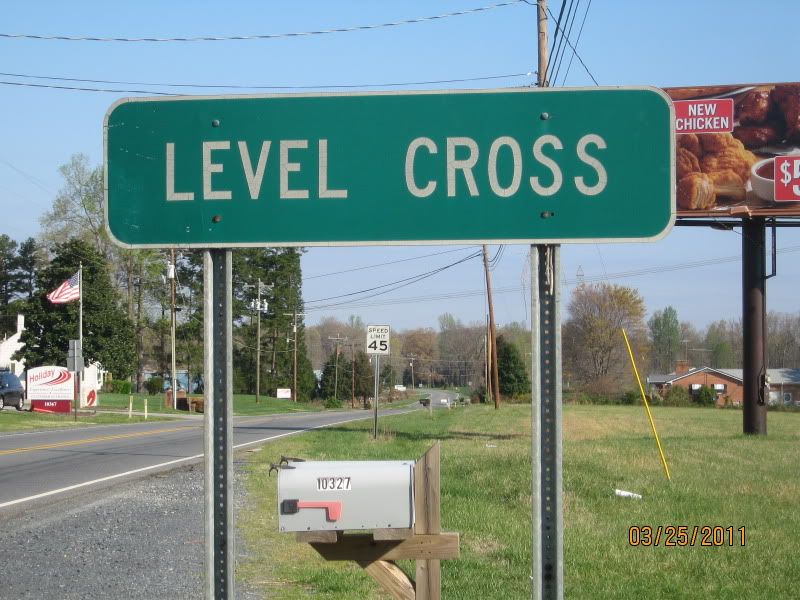 In 1997, my co-founder of the Schaefer Racing Hall of Fame lived in High Point, NC. Before going to the Coca-Cola 600, we took a short trip to Level Cross. I got to see the shops from the outside, and we visited the cramped museum-of-that-day that was shoehorned into one of the PE buildings.
In 1997, my co-founder of the Schaefer Racing Hall of Fame lived in High Point, NC. Before going to the Coca-Cola 600, we took a short trip to Level Cross. I got to see the shops from the outside, and we visited the cramped museum-of-that-day that was shoehorned into one of the PE buildings.
In recent years, the King remodeled an old furniture store 15 minutes down Highway 200 in Randleman. There he opened the Richard Petty Museum, and I got to visit it for the first time a week ago.
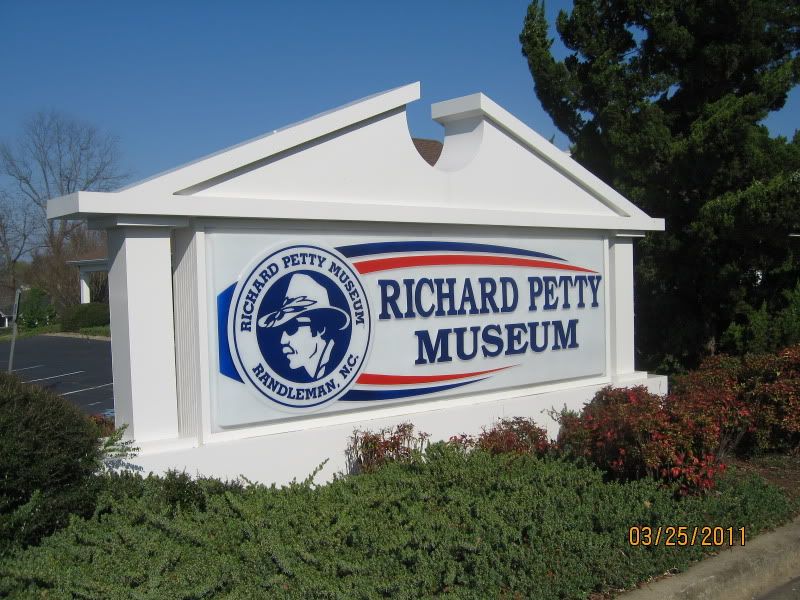 I have no information about the business in the building before it became the museum. But somehow I think its more than just a coincidence the street number of the museum is 142. Considering the respect Richard had for his dad, Lee, and the use of #42 by Lee for substantially all of his career, I think this is a nice tribute to the patriarch - coincidental or not.
I have no information about the business in the building before it became the museum. But somehow I think its more than just a coincidence the street number of the museum is 142. Considering the respect Richard had for his dad, Lee, and the use of #42 by Lee for substantially all of his career, I think this is a nice tribute to the patriarch - coincidental or not.
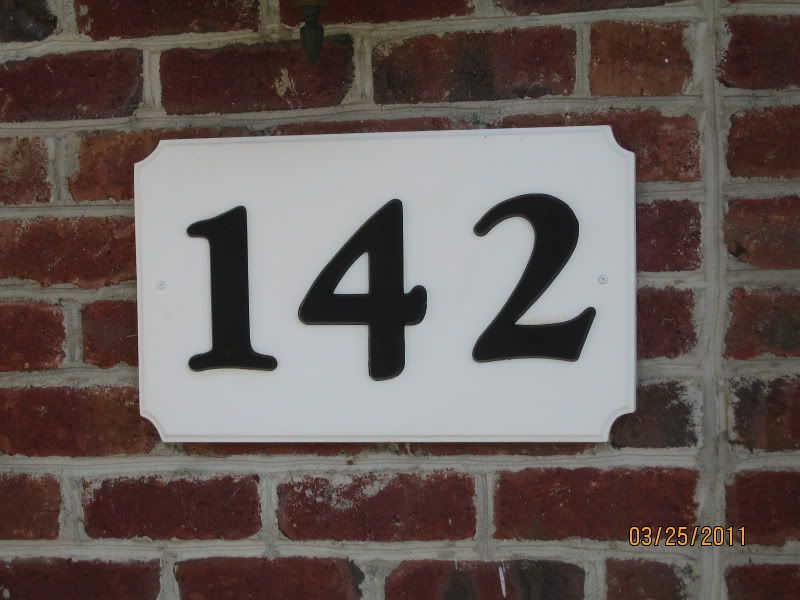 I've already blogged about my number one target for my visit - the 1970 Schaefer 300 trophy. However, I wanted to observe as much as I could in the few hours I had to visit. It didn't take me long to pick up on a couple of things:
I've already blogged about my number one target for my visit - the 1970 Schaefer 300 trophy. However, I wanted to observe as much as I could in the few hours I had to visit. It didn't take me long to pick up on a couple of things:
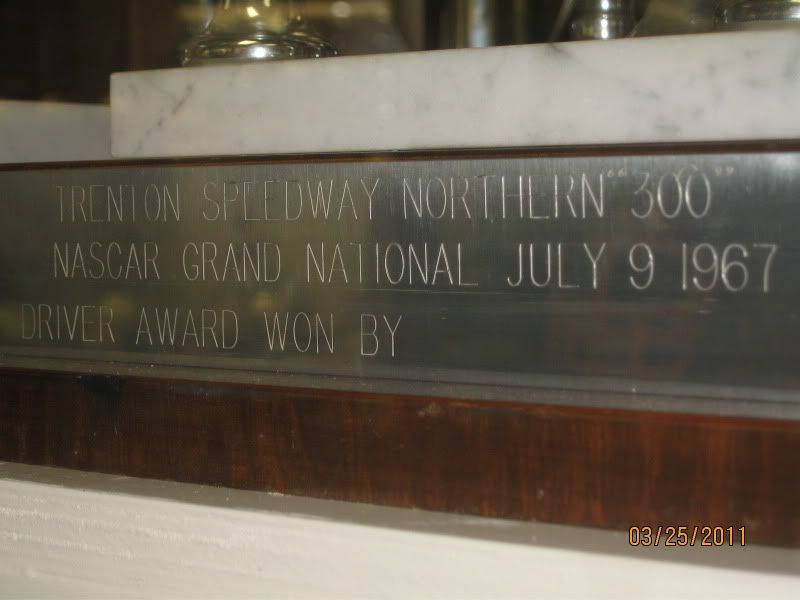 Taking photos was a challenge. Plexiglas covering the display cases created a pretty bad glare. Also, the cases included a ton of hardware won by the Petty teams making it a challenge to read the plaques - much less angle my camera to capture it and not get a bad glare. What I chose to do in large part was snap pictures of trophies in a couple of different ways: from some of the obscure/lost NASCAR tracks and some from races where another type of memory jogged in my mind as I looked at the trophy.
Taking photos was a challenge. Plexiglas covering the display cases created a pretty bad glare. Also, the cases included a ton of hardware won by the Petty teams making it a challenge to read the plaques - much less angle my camera to capture it and not get a bad glare. What I chose to do in large part was snap pictures of trophies in a couple of different ways: from some of the obscure/lost NASCAR tracks and some from races where another type of memory jogged in my mind as I looked at the trophy.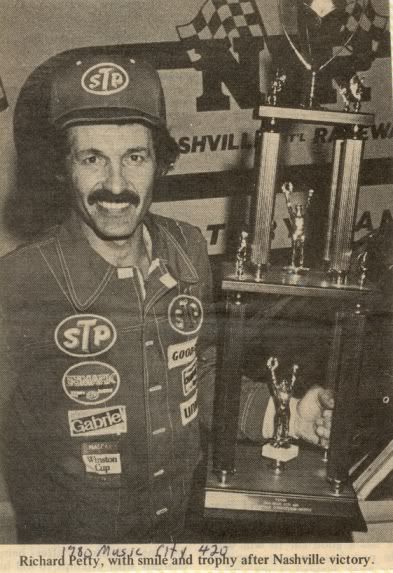
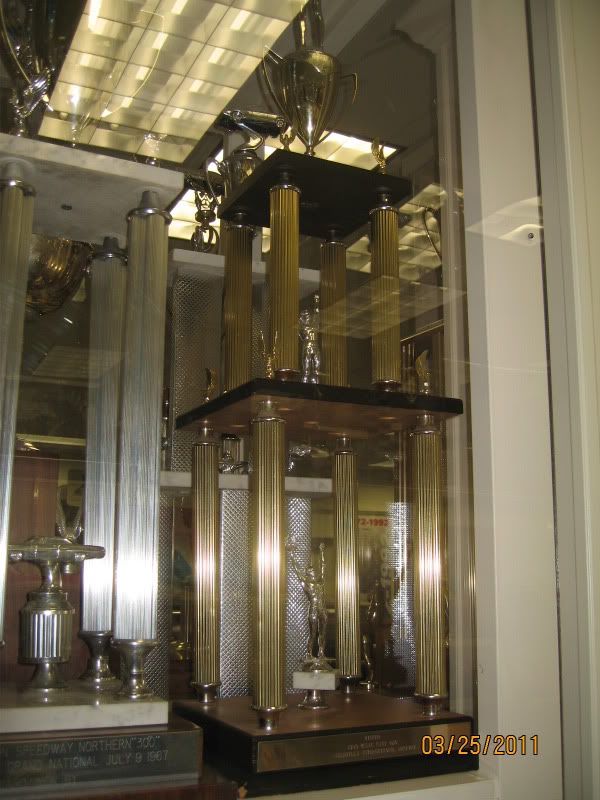
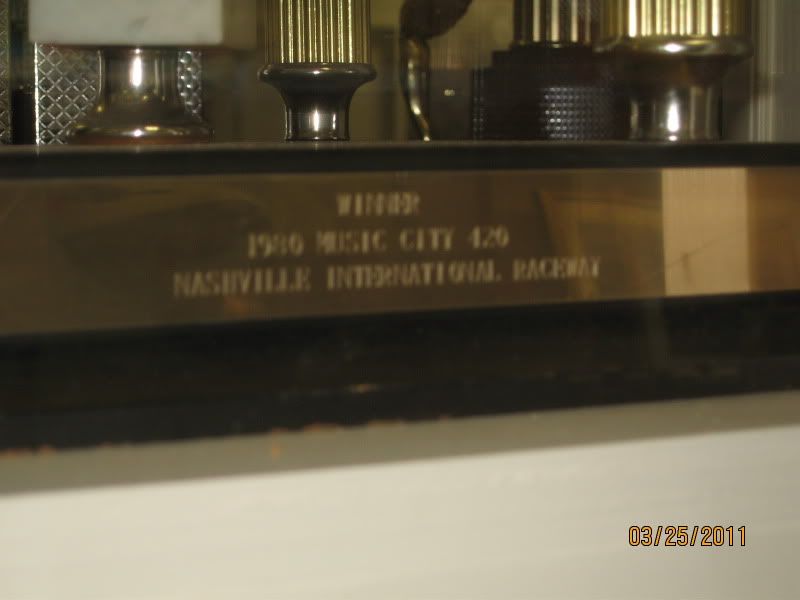 Kingsport - part of the Tri-Cities of East Tennessee - near where the Bristol track remains today. Kingsport hosted three Grand National races from 1969 - 1971. Richard won the 1969 and 1970 races, and he won the pole for the 1970 event. This is the trophy for his 1970 pole win. As mentioned earlier, note how the pole winner's name and speed were never engraved. Also, today's pole winners are recognized by Coors Light. Previously, Budweiser and Busch sponsored the pole awards. But how about back in the day with Falstaff paying for the honors!
Kingsport - part of the Tri-Cities of East Tennessee - near where the Bristol track remains today. Kingsport hosted three Grand National races from 1969 - 1971. Richard won the 1969 and 1970 races, and he won the pole for the 1970 event. This is the trophy for his 1970 pole win. As mentioned earlier, note how the pole winner's name and speed were never engraved. Also, today's pole winners are recognized by Coors Light. Previously, Budweiser and Busch sponsored the pole awards. But how about back in the day with Falstaff paying for the honors!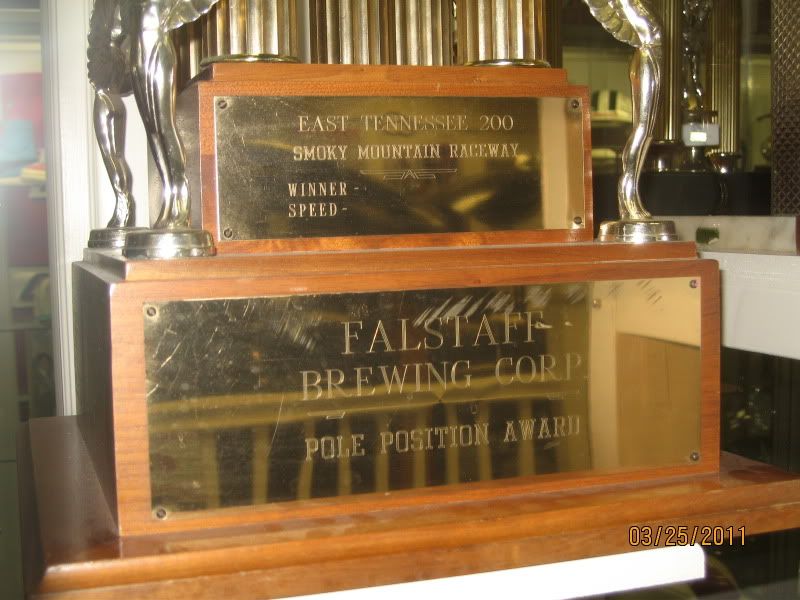 Maryville - This half-mile dirt track near Knoxville hosted 12 Grand National races. Richard entered 10 of them, and he won 6 of the races he entered - including the final GN race there in 1971. My uncle who introduced me to racing in 1974 and told me I had to pull for Ol' Blue if I expected him to take me to races met the King at both Kingsport and Maryville.
Maryville - This half-mile dirt track near Knoxville hosted 12 Grand National races. Richard entered 10 of them, and he won 6 of the races he entered - including the final GN race there in 1971. My uncle who introduced me to racing in 1974 and told me I had to pull for Ol' Blue if I expected him to take me to races met the King at both Kingsport and Maryville.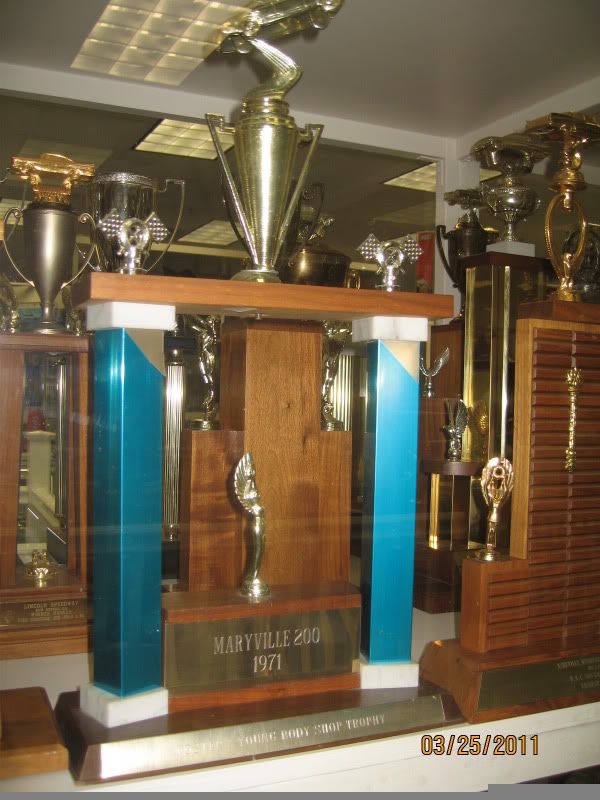 Chattanooga - Boyd's Speedway is still around today as a local bullring. It hosted two Grand National races - one each in 1962 and 1964. The King won the pole for both races, but he didn't win either of them. I almost overlooked this trophy sitting on the top shelf of one of the cabinets. I'm guessing its for one of his pole wins; however, I'm not certain for which year.
Chattanooga - Boyd's Speedway is still around today as a local bullring. It hosted two Grand National races - one each in 1962 and 1964. The King won the pole for both races, but he didn't win either of them. I almost overlooked this trophy sitting on the top shelf of one of the cabinets. I'm guessing its for one of his pole wins; however, I'm not certain for which year.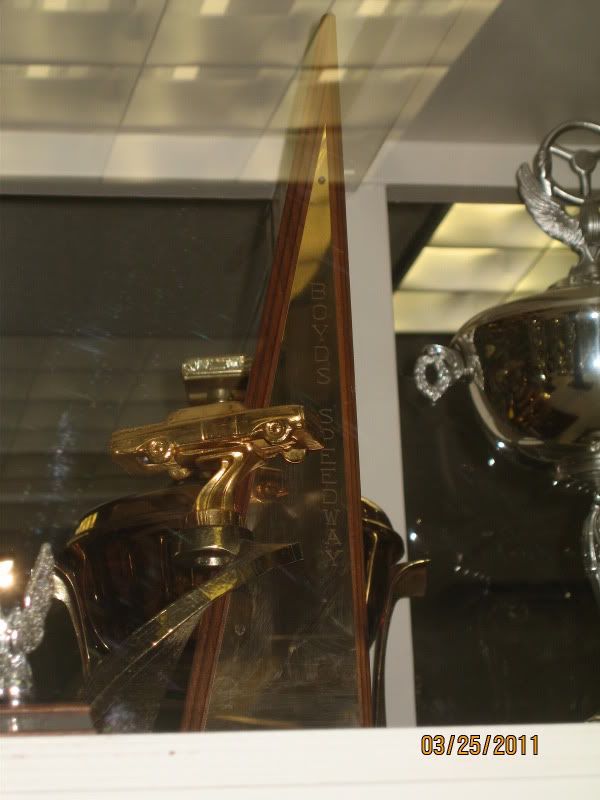 West Virginia - Petty won three of the four races he entered at what used to be known as West Virginia International Speedway and now known as Ona Speedway. His third win was in the final Grand National race there: the 1971 West Virginia 500.
West Virginia - Petty won three of the four races he entered at what used to be known as West Virginia International Speedway and now known as Ona Speedway. His third win was in the final Grand National race there: the 1971 West Virginia 500.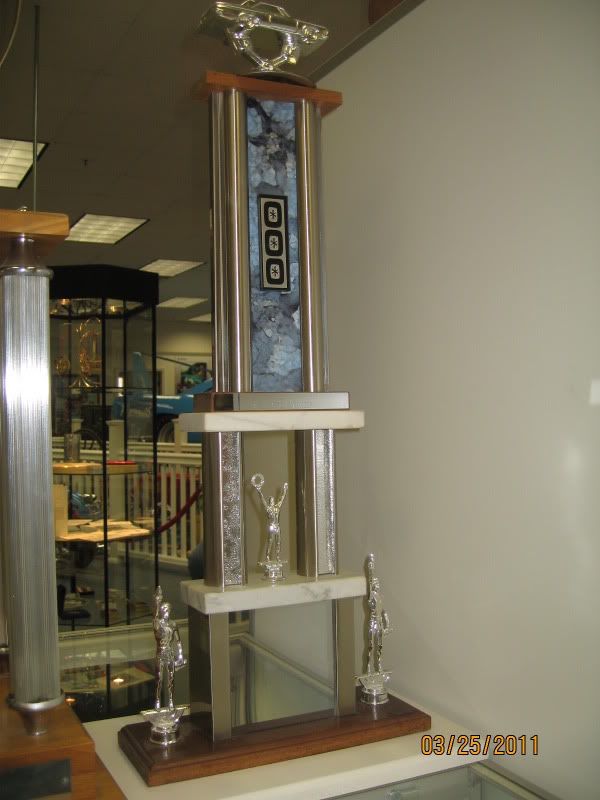
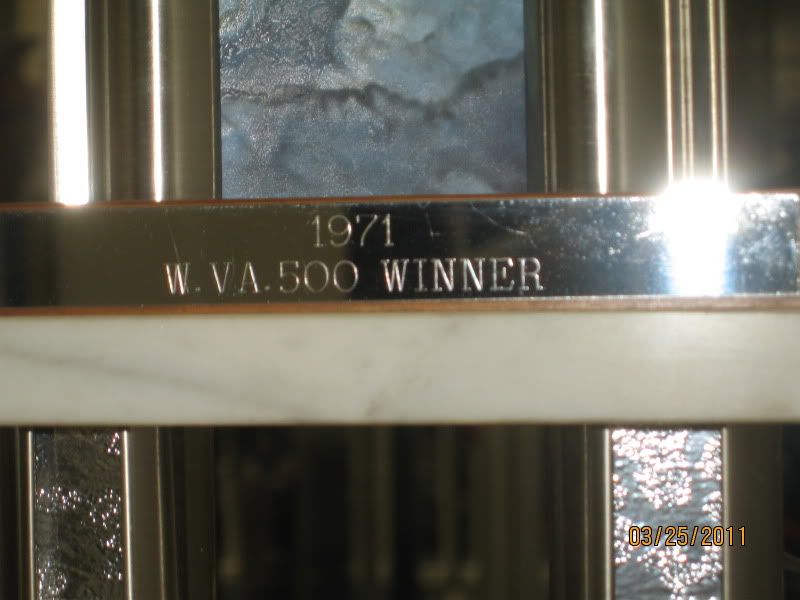 Fonda, NY - Historical revisions by NASCAR's media staff, ignorance by self-centered TV race 'analysts' and lazy media coverage lead many folks to believe NASCAR raced just in the south before R.J. Reynolds started its Cup sponsorship and that growth in northern and western markets only happen the last two or three decades. The truth is NASCAR ran plenty of races in northern cities such as Toronto, Islip/Long Island, Chicago, Bridgehampton NY, Oxford ME, and Fonda NY. The Grand National cars raced three times at Fonda. The King won the pole for the first two races, and he won the race at the last two of them. This trophy is from either his win in 1967 or 1968.
Fonda, NY - Historical revisions by NASCAR's media staff, ignorance by self-centered TV race 'analysts' and lazy media coverage lead many folks to believe NASCAR raced just in the south before R.J. Reynolds started its Cup sponsorship and that growth in northern and western markets only happen the last two or three decades. The truth is NASCAR ran plenty of races in northern cities such as Toronto, Islip/Long Island, Chicago, Bridgehampton NY, Oxford ME, and Fonda NY. The Grand National cars raced three times at Fonda. The King won the pole for the first two races, and he won the race at the last two of them. This trophy is from either his win in 1967 or 1968.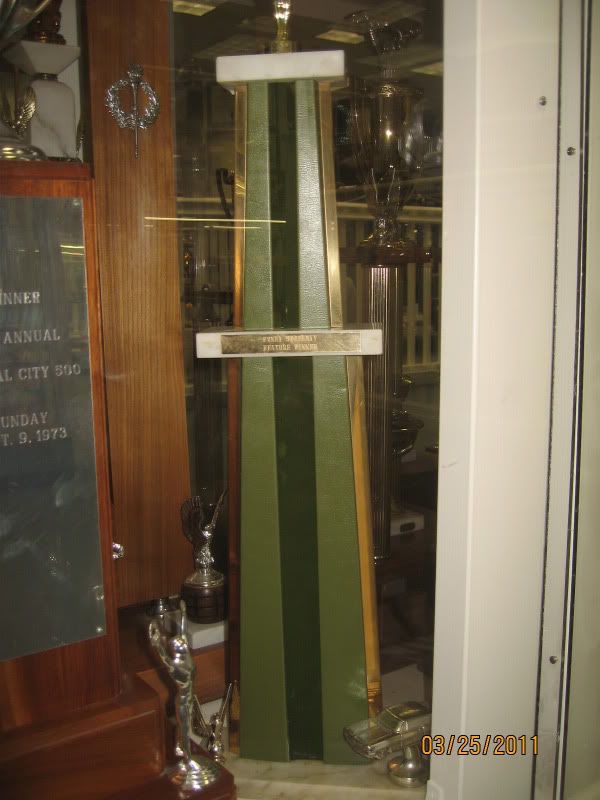
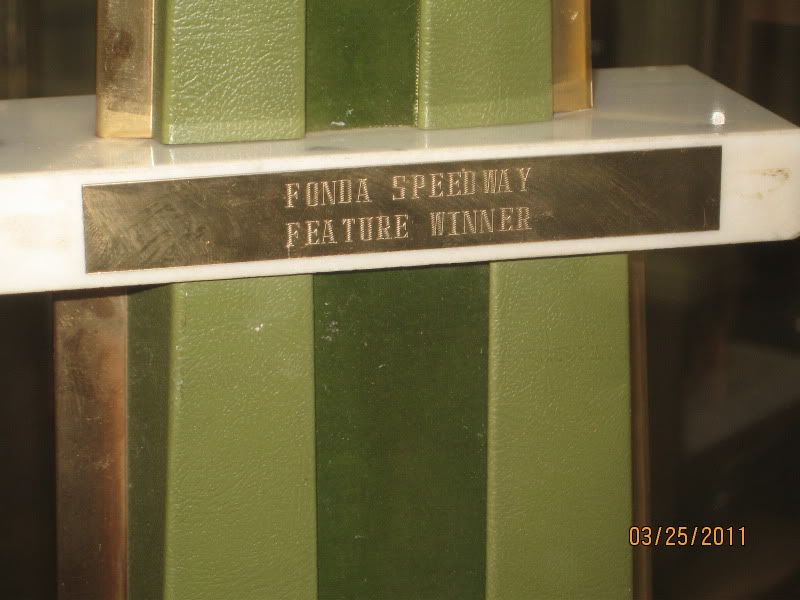 I spotted a trophy for one of Richard's wins at Islip, NY. However, I simply could not get my camera to take the ideal shot. Auto-focus, a tough angle, and flash glare all worked against me on it. ( Click here for a blog entry I wrote about Islip in June 2010.)
I spotted a trophy for one of Richard's wins at Islip, NY. However, I simply could not get my camera to take the ideal shot. Auto-focus, a tough angle, and flash glare all worked against me on it. ( Click here for a blog entry I wrote about Islip in June 2010.)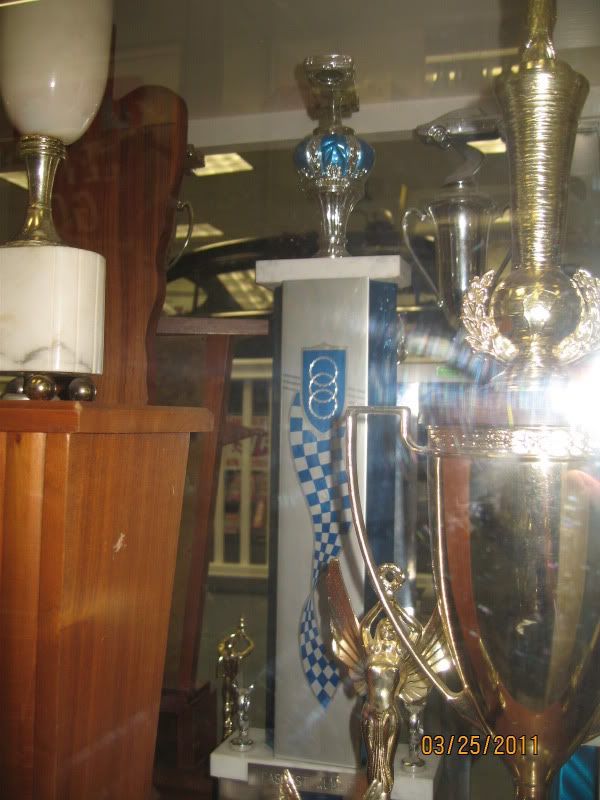
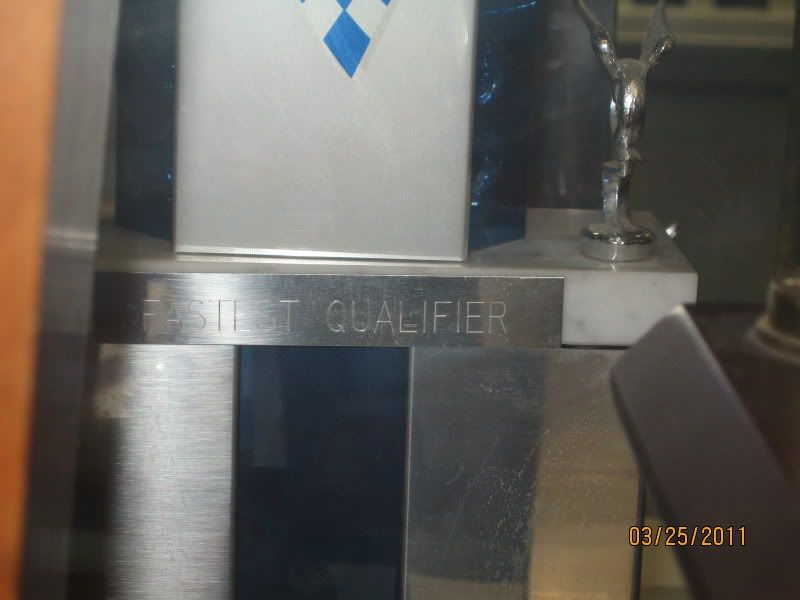 And here are the twins for the race win - one is for the winning driver and the other is for the winning car owner. Of course, the King took home both pieces of hardware since he co-owned the joint back home in Level Cross.
And here are the twins for the race win - one is for the winning driver and the other is for the winning car owner. Of course, the King took home both pieces of hardware since he co-owned the joint back home in Level Cross.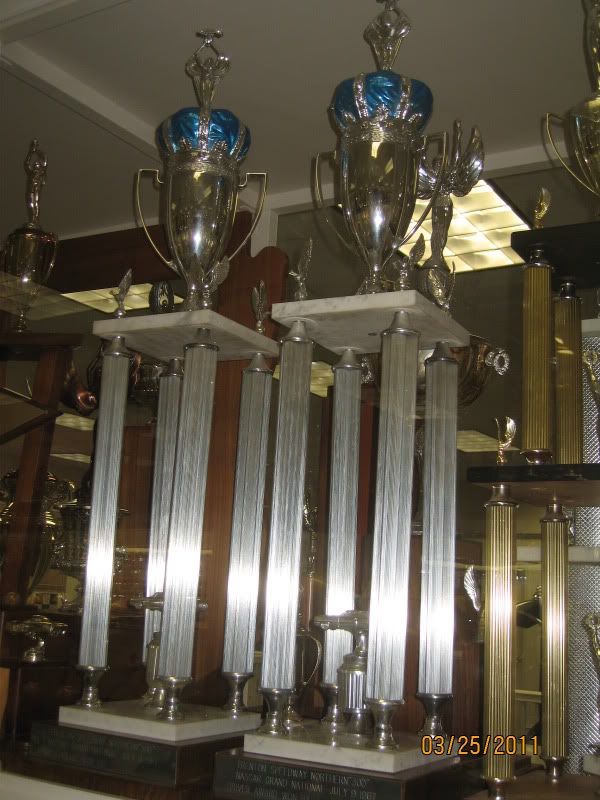 So I found the winning trophies for the 1967 and 1970 Trenton races. I was not successful in finding the winning trophy from 1971. Was it there? Perhaps. But I tried to carefully look in each case searching for novel wins such as that one.
So I found the winning trophies for the 1967 and 1970 Trenton races. I was not successful in finding the winning trophy from 1971. Was it there? Perhaps. But I tried to carefully look in each case searching for novel wins such as that one.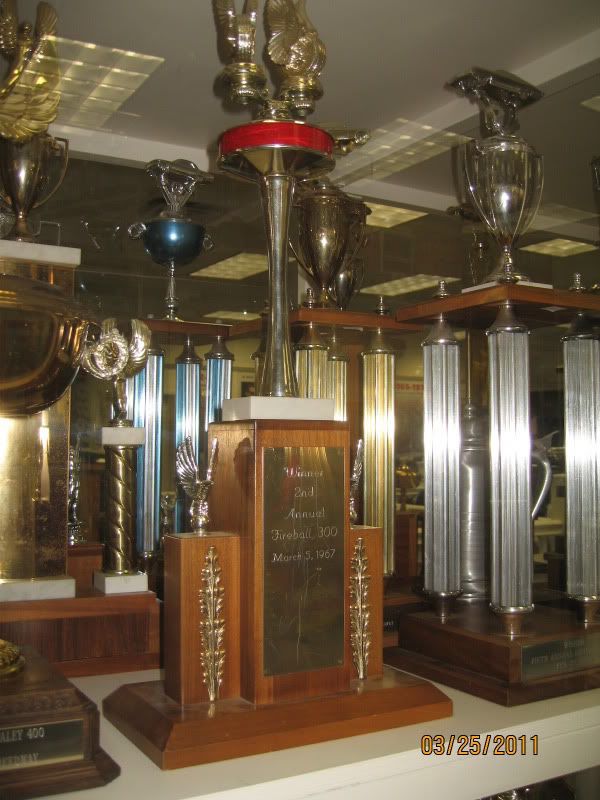
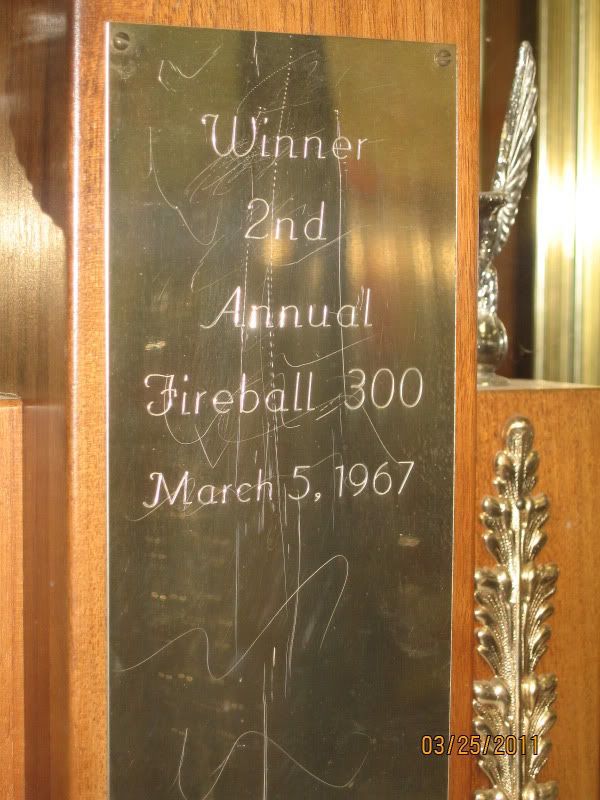 Riverside - The twisting road course outside of Los Angeles was a staple of the Grand National / Winston Cup Series from the early 1960s until its demise in the late 1980s. I thought this was one of the more unique trophies I saw. Richard won this one for the Falstaff 400 in June 1970 driving his Plymouth Superbird.
Riverside - The twisting road course outside of Los Angeles was a staple of the Grand National / Winston Cup Series from the early 1960s until its demise in the late 1980s. I thought this was one of the more unique trophies I saw. Richard won this one for the Falstaff 400 in June 1970 driving his Plymouth Superbird.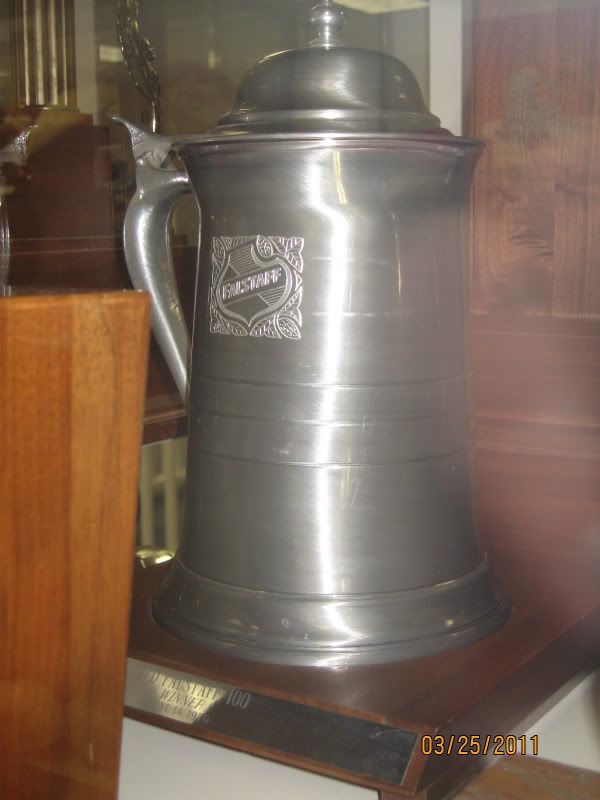 Richard was also given a larger, more traditional trophy for the win; however, I didn't see it in the cases. Here is a better view of the other trophy I didn't find.
Richard was also given a larger, more traditional trophy for the win; however, I didn't see it in the cases. Here is a better view of the other trophy I didn't find.
 One thing I found interesting about the trophy is the Marlboro sponsorship. Just four years later, R.J. Reynolds' Winston cigs would become the title sponsor of the series, and competing cigarette brands would no longer sponsor tracks, races or drivers.
One thing I found interesting about the trophy is the Marlboro sponsorship. Just four years later, R.J. Reynolds' Winston cigs would become the title sponsor of the series, and competing cigarette brands would no longer sponsor tracks, races or drivers.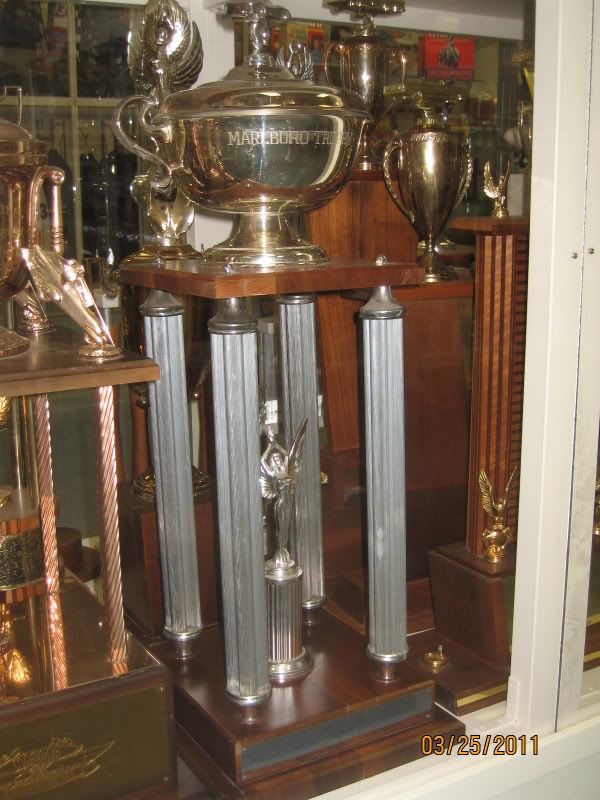
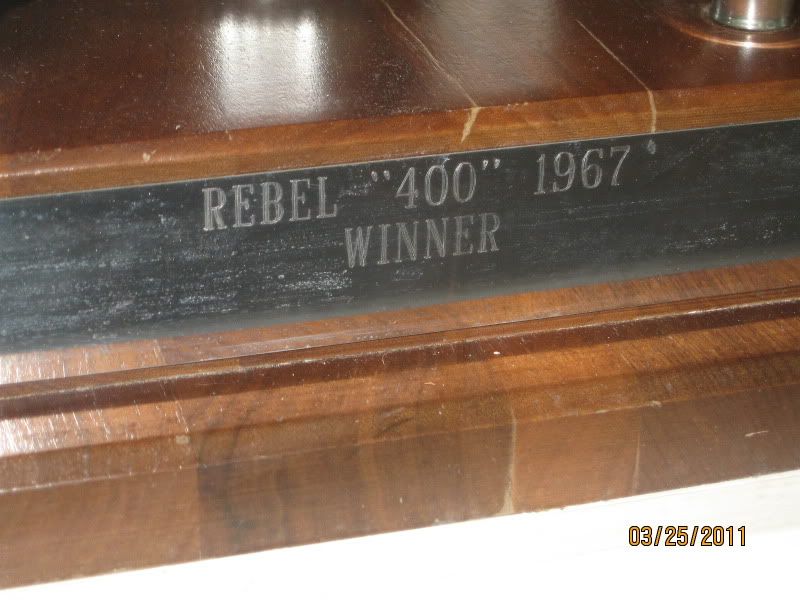
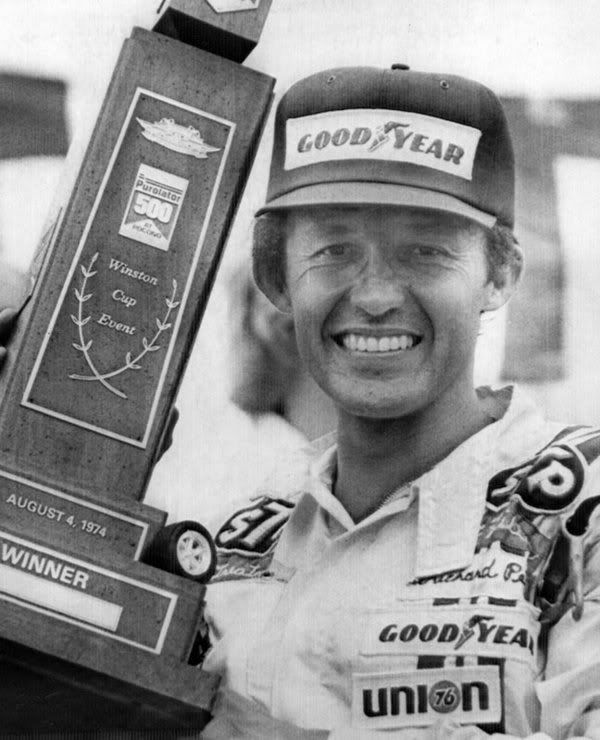 Again - note the plate for the winning drive was never engraved.
Again - note the plate for the winning drive was never engraved.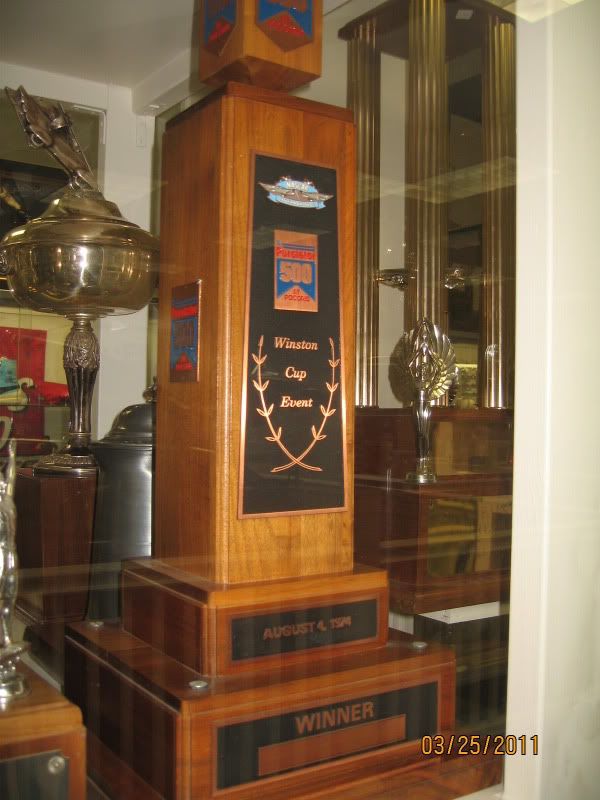 I'll next include some photos of trophies from wins at tracks that remain on the Cup schedule - and with a reason why I saw fit to shoot them.
I'll next include some photos of trophies from wins at tracks that remain on the Cup schedule - and with a reason why I saw fit to shoot them.